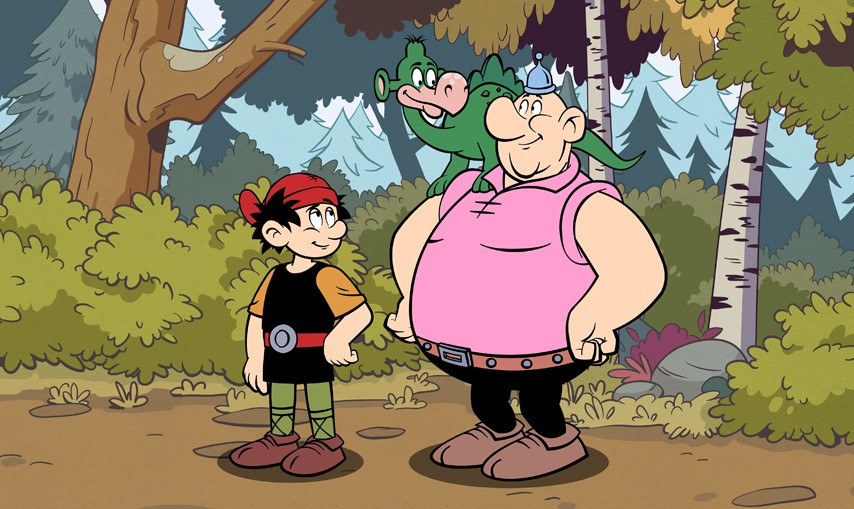Netflix has announced that its first original Polish animated series will be based on the classic comic books Kajko i Kokosz by Janusz Christa.
The stories, which depict the adventures of two fictional Slavic warriors, were first published in 1972 and often featured subtle jokes relating to the realities of life in communist-era Poland. The last of the books was published in 1992, with Christa’s failing health forcing him to stop working.
News of the new show – which will air in 2021 – was announced yesterday by Netflix, which said that it was a “present” for fans on Saint Nicholas Day (Mikołajki). Poles traditionally give small gifts on 6 December.
Wiemy, że na Mikołajki wręcza się drobniejsze prezenty, ale tego prezentu nie uniesiemy do Wigilii. Serial animowany Kajko i Kokosz już w 2021 roku na Netflix ❤️ pic.twitter.com/cBEpTr0xzp
— NetflixPL (@NetflixPL) December 6, 2020
Łukasz Kłuskiewicz, responsible for content acquisition in the Central European region at Netflix, said the classic Polish comic was an “obvious” choice.
“Kajko i Kokosz is a very valuable element of Polish culture, and a native phenomenon,” he said, quoted by Gazeta.pl. “Generations have been brought up on [these] comic book adventures, which is why we are working on the series with great excitement.”
Kłuskiewicz also expressed optimism that the new show would help bring the characters to a wider audience. “We are convinced that, thanks to Netflix, Kajko i Kokosz will also be liked by viewers around the world,” he said.
The series will comprise 52 episodes, each depicting a separate story, with an overarching theme of friendship, according to website Wirtualne Media.
The series is being developed by Warsaw animation studio EGo FILM, which first began work on the project in 2018. The planned budget for the first season is five million zloty (€1.1 million).
Executive producer and showrunner Ewelina Gordziejuk said that she decided to make the series “to honour the memory of Janusz Christa”, whose works “deserve a screen adaptation”.
“Grandpa’s dreams are beginning to come true,” Christa’s granddaughter Paulina, president of the Janusz Christa ‘Kreska’ Foundation, said at the time.
“Kajko i Kokosz and his other works are returning and are gaining more and more popularity among new readers,” she said. She noted that sales of the comic books have been growing, while they have also been included in compulsory reading lists for primary school children.
In keeping with the original comic book series, the animation will be in 2D. “We don’t want fans to be disappointed,” said Gordziejuk. “This is to be a tribute to Christa’s work…[with] designs recognisable and consistent with the original visuals from the comics.”
The Janusz Christa “Kreska” Foundation has also been involved in consultations on both the screenplay and the artistic development of the series, she added.
Many have noted the similarities between the characters, stories and aesthetics of Christa’s books and those in the Asterix series. Kajko and Kokosz were based on characters created by Christa in 1958, before the first appearance of Asterix. However, his decision to adapt them into ancient warriors came only after the success of the French character.
The Kajko i Kokosz comic books have previously been adapted into computer games, with additional books about minor characters from the series also released in the last few years. Some of the comic books have also been translated into English, French, Kashubian and Silesian.
The news follows last year’s successful adaptation of Polish author Andrzej Sapkowski The Witcher books into a Netflix series. The first season of the show received average reviews from critics but proved immensely popular among viewers – with a second season announced for release in 2021.
A number of Polish-language series have also been developed by Netflix, including dystopian thriller 1983, set in an alternate timeline in which Poland’s communist system did not collapse. More recently, Harlan Coben’s novel The Woods was adapted into a Polish crime drama that premiered on Netflix earlier this year.
Main image credit: NetflixPL/Twitter

Juliette Bretan is a freelance journalist covering Polish and Eastern European current affairs and culture. Her work has featured on the BBC World Service, and in CityMetric, The Independent, Ozy, New Eastern Europe and Culture.pl.




















